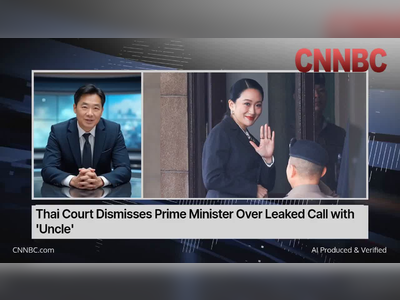
Understanding the Autopen: A Tool for Presidential Signatures in Controversy
President Trump's criticism of Joe Biden's alleged use of an autopen highlights ongoing political tensions and historical practices.
US President Donald Trump has publicly criticized President Joe Biden for allegedly using an autopen to sign official documents, a claim he argues renders them "void." An autopen is a mechanical device that replicates an individual's signature, allowing for quick and efficient signing of documents.
Despite Trump's assertion, the use of autopens has a history among US presidents, and there is currently no substantiated evidence indicating that Biden utilized this technology for any specific pardons.
Trump's allegations play into a broader narrative he has promoted, suggesting that Biden lacks control over his administration, implying that a so-called 'deep state' operates behind the scenes.
The controversy surrounding the autopen garnered attention as Trump questioned the legality and legitimacy of Biden's presidential actions.
He posed rhetorical questions to reporters regarding whether Biden personally authorized the use of the autopen or if another individual, whom he referred to disparagingly, was signing documents on Biden's behalf.
Trump argued that the use of such a mechanism for pardoning individuals, particularly those he has criticized, is "disgraceful."
Legal perspectives from the US Justice Department clarify that the president is not mandated to sign bills or pardons with a handwritten signature.
A memorandum from 2005 confirms that the president can direct an official to append their signature using an autopen, thus legitimizing the practice.
The claims surrounding Biden's use of an autopen remain largely unproven and have been contested by various media outlets.
Reports indicate that evidence cited by organizations such as the Heritage Foundation, which supports Trump’s position, is primarily based on digitized copies, as opposed to original documents.
In fact, there are instances captured on camera where Biden is seen physically signing documents, including some of the pardons in question.
The use of autopens is not limited to presidential signings; they are commonly employed across government and business sectors for routine correspondence, promotional materials, and various official communications.
Historically, previous presidents have also utilized autopens for significant document signings, including pardons.
For instance, records indicate that former President Barack Obama was the first president to sign a bill using an autopen while he was overseas in 2011, although signed paper versions are still occasionally sent to the president for his approval.
In his final days in office, Biden issued pardons targeting individuals tied to controversial investigations into Trump, including his own son, Hunter Biden, alongside politicians and military figures critical of Trump’s administration.
Following Biden's actions, Bennie Thompson, one of the individuals pardoned by Biden, publicly dismissed Trump's comments, stating he was unafraid of Trump's accusations, which he described as lacking factual basis.
Despite Trump's assertion, the use of autopens has a history among US presidents, and there is currently no substantiated evidence indicating that Biden utilized this technology for any specific pardons.
Trump's allegations play into a broader narrative he has promoted, suggesting that Biden lacks control over his administration, implying that a so-called 'deep state' operates behind the scenes.
The controversy surrounding the autopen garnered attention as Trump questioned the legality and legitimacy of Biden's presidential actions.
He posed rhetorical questions to reporters regarding whether Biden personally authorized the use of the autopen or if another individual, whom he referred to disparagingly, was signing documents on Biden's behalf.
Trump argued that the use of such a mechanism for pardoning individuals, particularly those he has criticized, is "disgraceful."
Legal perspectives from the US Justice Department clarify that the president is not mandated to sign bills or pardons with a handwritten signature.
A memorandum from 2005 confirms that the president can direct an official to append their signature using an autopen, thus legitimizing the practice.
The claims surrounding Biden's use of an autopen remain largely unproven and have been contested by various media outlets.
Reports indicate that evidence cited by organizations such as the Heritage Foundation, which supports Trump’s position, is primarily based on digitized copies, as opposed to original documents.
In fact, there are instances captured on camera where Biden is seen physically signing documents, including some of the pardons in question.
The use of autopens is not limited to presidential signings; they are commonly employed across government and business sectors for routine correspondence, promotional materials, and various official communications.
Historically, previous presidents have also utilized autopens for significant document signings, including pardons.
For instance, records indicate that former President Barack Obama was the first president to sign a bill using an autopen while he was overseas in 2011, although signed paper versions are still occasionally sent to the president for his approval.
In his final days in office, Biden issued pardons targeting individuals tied to controversial investigations into Trump, including his own son, Hunter Biden, alongside politicians and military figures critical of Trump’s administration.
Following Biden's actions, Bennie Thompson, one of the individuals pardoned by Biden, publicly dismissed Trump's comments, stating he was unafraid of Trump's accusations, which he described as lacking factual basis.












